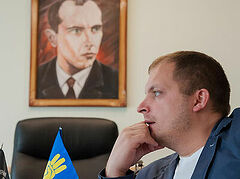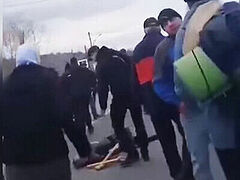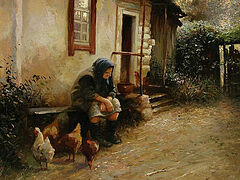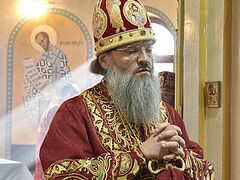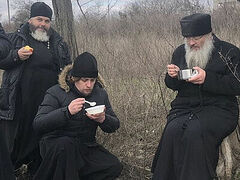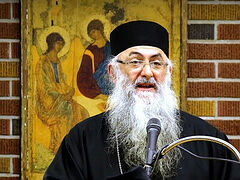On March 31, 2022, Metropolitan Luke (Kovalenko) of Zaporozhie and Melitopol gave a video interview to journalists of the BBC Russian service.
Met. Luke was born July 11, 1971 in the town of Kharitsizsk, in the Donetsk region of the Ukraine. He graduated in 2000 from the Donetsk State Medical University, although he was already a priest of the Ukrainian Orthodox Church, graduating from the Kiev Theological Academy in 2002. He was tonsured a monk in 2003, and given the name Luke, after St. Luke (Voino-Yasenetsky) of Crimea. Fr. Luke was consecrated a bishop in November 2005, and after having served in several different dioceses, including as abbot of Glinsk Monastery, he was appointed in 2010 as Metropolitan of the Zaporozhie diocese.
In Zaporozhie, historically famous as the home of the Zaporozhian Cossacks, Met. Luke also became the spiritual guide of the Ukrainian Cossacks and youth organizations. Meanwhile, he also succeeded in becoming a doctoral candidate in medical sciences, in the Kharkov National Institute of Medicine.
Met. Luke has always been a sober-minded opponent of the rather cavalier disdain for canonical law and order that has developed in Ukrainian religious affairs during recent years.
Is the War in Ukraine God’s punishment?
—How did you react to Russia’s invasion of Ukraine?
—I was away from Ukraine at the time, but it was a shock to hear that Russia attacked our country. I could never have believed it…
—Why did it happen?
—I am a Christian. It is sin. It is the desire for power, to rule… But the worst thing is that we have simply become slack, and this is how God acts with all mankind. Whenever man abandons God, what does God allow? We know very well. And this is, you see, something God has allowed. We want to measure it with our human considerations—sociological considerations, political considerations… But I would like people to assess according to spiritual considerations who is at fault. Just remember what the Gospel says: Does the sun only shine on the righteous? Does the rain fall only upon those who work the land? No, the sun shines and the rains falls on both the sinners and the righteous… Every one of us adds his own mite to the cup of evil. Apparently, the last drop was added. Now the cup of God’s wrath has poured out on us.
I have never said that we shouldn’t defend our country. There is no greater podvig than when a man lays down his life for his friends. And the Church blesses the defense of one’s country. The Church prays for its soldiers. You will not find from our hierarchs any statements that we should not defend our country…
LGTB laws
The Ukraine parliament recently changed its laws in parliament to conform to the LGTB+ program being pushed by Western countries around the world, often as a condition to financial aid. The first step has been to enact anti-discrimination laws, which makes it possible for gay parades to take place openly in the country. The first gay parade took place illegally in Kiev in 2013, and have been held legally every year since 2016. In 2011, the law was changed to allow people who had undergone gender change surgery to change the names in their passports to reflect their “new” gender, and in 2016 amendments were made to enable changes to passports without having had surgery.
It must be added that most Ukrainian’s are very conservative in this respect, and these changes were not welcomed by the majority of the population.
—In another interview you said that the war in Ukraine can be blamed on the LGTB community.
—That is one of the reasons. Perhaps that was the last drop, which made God’s wrath pour out upon us. But look, it’s just madness. We say, “Holy Rus’”. We say, “Golden-domed Kiev”. But forgive me—what is this? It’s total insanity. Did anyone ask us whether we want this or not?
—But bombs are not only falling on Kiev. What about the Sviatogorsk Lavra?
—Did you pay attention to what I said? The sun shines on both the righteous and the sinners.
You understand, that’s my view of it, because not long ago there was a statement made to change a resolution in parliament by our deputies, whom no one amongst the Ukrainian people authorized to sign such a document… You understand, when a man lusts for power, he sees the people not has the source of his power, but as something over which he wields power. That is what is so terrible. They say, that’s how it will be. But that kind of treatment of ordinary people is also a violation of God’s commandments… Society has taken an anti-natural path, not its own path. This introduction, this allowance of this sin is what was written into that law and signed.
—People have said that you’ve stated that the gays are the reason for the war. Is that an oversimplification?
—Yes. It is only one of the reasons.
Prayer for peace
When the war began, Patriarch Kirill asked the parishes and monasteries of the Russian Orthodox Church to say a prayer for peace during the Liturgy. The prayer asks the Lord for peace and unity amongst those who have come from the same baptismal font, and to protect Holy Rus’ from the devices and attacks of those alien to it. As Patriarch Kirill stated on February 27, “May the Lord preserve the Russian land. When I say ‘Russian’, I use the ancient expression from the Tale of Bygone Years [the primary chronicle of Russian history written ca. 1113 by Monk Nestor of the Kiev Caves Monastery. Ancient chronicles of Russian history after Baptism generally use the word, Rus’, which not every reader understands. Emphasis by OC.]—‘From whence the Russian land has come,’ the land which now includes Russia, Ukraine, Belarus, and other tribes and peoples. That the Lord may protect the Russian land against external enemies, against internal disorders; that the unity of our Church may strengthen and that by God’s mercy all the temptations, diabolical attacks, and provocations may retreat and that our devout people in Ukraine may enjoy peace and tranquility”.1
By contrast, Ephiphany Dumenko, head of the Constantinople-established “Orthodox Church of Ukraine”, has been circulating prayers specifically for the Ukrainian army and victory for the Ukraine, without any mention of the unity of these peoples who came from the same Baptismal font.
—What about the prayer Patriarch Kirill instituted at the beginning of the war—against aliens who have taken up arms against Holy Rus’…
—I read another prayer. But first of all, Holy Rus’ is Kiev. I’m not saying this because I’m a nationalist or because I’m pulling the blanket over to my side, but because Holy Rus’ was first of all Kievan Rus’.
—Metropolitan Onuphry calls this a war, while Patriarch Kirill calls it a Special Operation.
I only know about what I’ve seen with my own eyes. I can’t answer for other peoples’ words, and don’t consider it appropriate to make a judgment about what they’ve said. We don’t know the context. We don’t know what they were thinking. We only know that our people, Ukrainians, are perishing. And Russian soldiers are perishing. But our cities are being destroyed. Therefore, I decisively uphold the position of my chief hierarch, Metropolitan Onuphry.
On the non-commemoration of Patriarch Kirill in some Ukrainian churches
Because Patriarch Kirill has not specifically asked Putin to pull Russian troops out of Ukraine, and has, according some people’s interpretation, voiced support for the war, saying that other countries are sowing divisions between two fraternal nations, some clergy in the UOC have stopped commemorating him during the Liturgy.
—Fifteen dioceses have refused to commemorate Patriarch Kirill. You call this a rebellion [smuta in Russian, which means generally troubles, turmoil, rebellion, confusion].
—Definitely. I do not commemorate the Russian citizen Nicholai Gundyaev. I commemorate the Patriarch of Moscow. And let anyone who does not commemorate him read the statutes of the Church. There is a unity of the Churches. And in the statutes it is written that the Ukrainian Orthodox Church is united with the fullness of Orthodoxy through the Russian Orthodox Church. In the statutes it clearly states whom we should commemorate and how. They say, the people are asking for it. But as the old saying goes, we should not bring our family rubbish out of the house for all to see. Today in fact we read [in the Old Testament] at the Liturgy about how Ham shamed his father. He brought the family rubbish out of the house for all to see. Even if he saw his father’s nakedness, he should have just kept silent about it—but instead he laughed at his father and shamed him before everyone. That was his sin. I consider that this is the sin of Ham. If there is a resolution passed at a Council [of the Synod], I will accept the decision.
—It has to be decided at a Council?
—Definitely. Not by individual decision. We are not fiefdom princelings, each sitting on his own cathedra. In another diocese they told me that they are going to expel their bishop because he is not commemorating the Patriarch. I said, at least don’t you bring division into our Church. I don’t know, I can’t judge him—perhaps he is under threat. I don’t know his fate. If you don’t know what to do, do what the statutes say, the law. We have our Church canons, we have the statutes. Only a council of bishops has the right to judge a bishop. But here everyone is so smart, everyone is a spiritual guide. People, look at what you are doing. It’s Great Lent, and instead of repenting you’re sowing division and looking at how to get more “likes”. They spew out all sorts of trash and abomination, and think, “look at how I’m saving the Church, how I’m saving Orthodoxy”.
—Met. Onuphry and the Synod of the Ukrainian Orthodox Church addressed Patriarch Kirill with the request to ask Putin to stop the war, but the Patriarch gave no answer.
—Tell me, when was the last time our government listened to us? No, they don’t listen to us. In whatever requests we make of them, they only look for their own profit; how to blacken our reputation, how to humiliate us, incite others to kill us. And when people ask us why we have been silent about the Donbass for eight years—we were never silent, we did everything we could to help. But who listened to us? I am not trying to defend anyone. But did anyone listen to us?2
—Do you know the opinion of other bishops?
—You know, I almost never discuss things with people over the telephone, and I think you understand why [laughs]… It’s us and four others on the line…
—In some dioceses clergy are gathering signatures to immediately call a council to proclaim the autocephaly of the Ukrainian Orthodox Church.
—With such a proclamation we give food to those who want to throw oil on the fire. But tell me—how am I in Zaphorozhie supposed to go to a Council? [Zaporozhie is in eastern Ukraine, and there is fighting going on in the lands between it and Kiev.]
Video format is not a solution. We can’t discuss things person to person. It’s like, you know, washing your hands with your gloves on.
I repeat, this has to be resolved at a Council of Bishops. Until this situation is resolved—perhaps writing letters, public appearances—we can’t make this decision.
—Is this rebellion, or schism?
Rebellion, (smuta) is one thing, schism is another. So far, we have rebellion… We have to find a golden mean. After all, would autocephaly really solve everything? That same man, the “Patriarch of Constantinople”, Bartholomew, who accepted the schismatics who had fallen away from the Church and gave them the so-called tomos—how will he give us a tomos? He’ll say, “I already gave you a tomos, go there!” You can’t regard the Church according to worldly gauges. It’s not the IRS where you go and get a document verifying the right to do business. The Church works through the grace of the Holy Spirit. And everything that contradicts or obstructs this grace is called graceless. And everyone who has fallen away from the Church has to return to the Church. Who of them will recognize this autocephaly [of the currently autonomous, canonical Church?] What will that give us? It will be like a torn-off sleeve, that no one recognizes. But the Church recognizes us as one in Christ. What has fallen away from the Church is no longer the Church. Now the goal of the enemies of Orthodoxy is the breakup of Orthodoxy. And this goal of breaking the Church into tiny shards—that is frightening.
Therefore, this matter has to be discussed more globally, and a canonical assessment needs to be made, within the context of what is happening. This can only be done at a Council.
Unity of the Russian and Ukrainian Churches. An example from WW2
—The Russian Church and the Ukrainian Church have had not only spiritual unity, but unanimity of thought. The spiritual unity remains; but after what is now going on, what unanimity of thought can there be?
—I will return first of all to what I said already, that our position must be discussed at a Council. A second example is the Second World War. During that war, the Romanian Church, an Orthodox Church, blessed its soldiers to go and destroy Ukrainians, Russians, and Moldovans, because it considered this a struggle against Communism. However, at the same time, Eucharistic communion was not interrupted between the Russian and the Romanian Churches. Stalin didn’t even demand that the Catholics of the Soviet Union renounce the Roman Pope… I don’t know what will happen after this. God will give us wisdom; God will not abandon us. That is why I keep stressing a Council.
—What about the laws being pushed in the Ukrainian parliament [to make the Ukrainian Orthodox Church illegal in the Ukraine, and to confiscate its property and give it to other religious organizations]?
—Is there anyone on the Ukrainian parliament who is an Orthodox Christian? [He shakes his head.]
—In Kiev it is being said that all the information in social networks, etc. about pogroms against the Orthodox is nothing more than a Kremlin-based psychological-disinformation operation.
—I’ll ask you one question. Have you read what they did with one priest in Smela? Some thugs broke into the church and beat up a priest. That’s what they did with an Orthodox priest! While the president has said clearly that he was thankful to the priests, the priests of the Orthodox Church.
—But our colleagues from Smela reported that the parish community wanted to leave the Russian Orthodox Church…
—They wanted to leave… So they grabbed the priest by the collar and dragged him across the ground? Yes, that is how it was—they entered the church with automatic rifles and dragged him out…
—But this story is a very big compromat instrument.
—I don’t read the Russian news, but I see what is happening in Zaparozhie. Our leaders have their hands full, working day and night with defense, helping people. But what are those people [who are pushing the anti-Church law in parliament] doing in, God knows wherever they are? They have nothing better to do than write laws like that. They should come here a work a little…
—We should have come to the table and resolved these problems, perhaps economically or some other way. But not by war. This has divided us for generations.
The Russian language
In Zaporozhie, which is in eastern Ukraine, Russian speakers are the majority. This is historically because the eastern regions of what is now Ukraine were once conquered from the Ottoman Empire and various nomadic tribes under Empress Catherine the Great. The area was then settled by people from both Russia and what is now central Ukraine, with the Russian language predominating, since it was from the onset part of the Russian Empire, and never a part of the Polish-Lithuanian Commonwealth, which ruled the western regions.
—What about the use of the Russian language in Ukraine?
—In what sense? People communicate with each other as they always have. That is not the question that needs to be discussed. I serve in Church Slavonic. If people come and ask me, Vladyka, we don’t understand you in Russian, could you please speak Ukrainian, I will. Therefore, I don’t consider this matter a stumbling block.
—So, when Putin comes to the Ukraine and says he’s come here to protect the Russian speakers, and to protect the Russian Church—what do you have to say about that?
—The Church didn’t ask him for that. We trust in God for protection. But as for me talking with my flock in Russian… It’s Russian language and not Russia language. I consider that it’s better to read Doestoevsky for example in Russian and not some other language. You’re going to say that I’m a supporter of the “Russian World”—no, I’m not at all a supporter of Russian World. I support the Orthodox world. And the Orthodox world extends not only to Russia or Odessa. It is the fullness of the Orthodox world, which I have seen everywhere.
—Do you support what Patriarch Kirill said about the Russian world extending wherever Russian is spoken?
—I don’t know what the Russian world is. It’s a theory. It’s not a dogma… There is Russian culture. There is Ukrainian culture. But please don’t drag culture into religion. I am an Orthodox person. And in general, I am a citizen of heaven, now that you mention it.
—We came from the same baptismal font, and Patriarch Kirill says that we are one people. Do you agree with this point of view?
—I agree with the position of my chief hierarch [Metropolitan Onuphry]. Let’s look at it from the medical point of view, embryology. You have for example all different kinds of muscles, and all of the muscles at one time came from the same cell. At one time we were the same nation. Historically I can’t argue with that. But now Russia and Ukraine are two different nations. The most terrible thing is that people who came from the same baptismal font are now fighting each other… Of course, it’s all in God’s hands, but I don’t think that this wound will heal soon…


